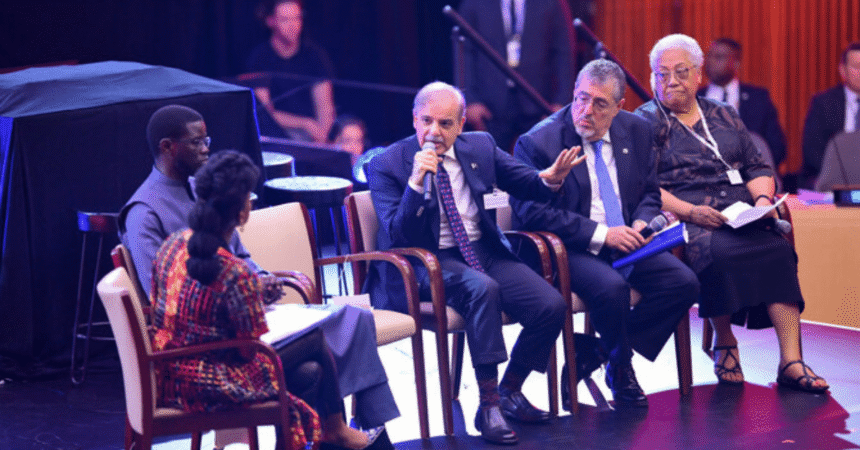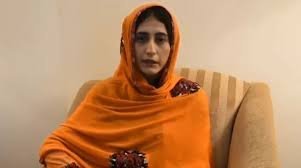Prime Minister Shehbaz Sharif recently made a compelling appeal for assistance from developed nations to help developing countries navigate the complexities of debt traps, particularly exacerbated by climate change. Speaking at the SDG Moment 2024 Meeting during the 79th United Nations General Assembly in New York, Sharif underscored the urgent need for global solidarity to combat the challenges faced by vulnerable nations.
The Impact of Climate Change on Developing Nations
During his address, Sharif highlighted the catastrophic effects of the 2022 floods in Pakistan, which were attributed to climate change. Despite being responsible for only a minuscule portion of global carbon emissions, Pakistan experienced unprecedented flooding that caused approximately $30 billion in damages. This stark reality highlights a significant inequity: developing nations bear the brunt of climate change consequences while contributing very little to the problem.
Sharif emphasized that it is essential for wealthy, industrialized nations to take responsibility for their role in climate change. He stated, “We do not contribute even a fraction of a percent in terms of carbon emissions,” pointing out the unjust burden placed on countries like Pakistan. He warned that without concerted support from developed nations, the “unbalanced and unjust system” would lead to further crises for developing countries.
The floods not only caused immediate destruction but also set back economic growth and development in the region. Infrastructure was severely damaged, agricultural production was disrupted, and countless livelihoods were destroyed. As a result, millions of people were pushed into poverty, highlighting the need for urgent international assistance to rebuild and recover.
The Cycle of Debt and Development Challenges
Sharif criticized the expectation that countries like Pakistan should continue borrowing to repay existing debts, labeling this cycle as a “death trap.” He explained how this situation further entrenches developing nations in financial instability, preventing them from achieving the Sustainable Development Goals (SDGs). The prime minister noted that the funding gap for these goals amounts to trillions of dollars, creating insurmountable barriers for countries striving for progress.
This cycle of debt is particularly burdensome in the context of climate change, as developing nations often need to allocate scarce resources to disaster recovery rather than investment in sustainable infrastructure and social programs. Sharif’s remarks reflect a broader concern among many developing nations that their financial futures are jeopardized by the dual pressures of debt and climate impacts.
The call for international support is not merely a request for aid; it is a recognition of the interconnectedness of global economies. When developing countries struggle under unsustainable debt, it affects not only their own citizens but also the stability of global markets. A more equitable approach to international finance is essential to fostering global stability.
Pakistan’s Fight Against Terrorism
In addition to addressing climate change and debt issues, Sharif recounted Pakistan’s ongoing struggle against terrorism. He noted that following the events of 9/11, Pakistan faced severe cross-border terrorism that claimed the lives of around 80,000 people and resulted in an estimated loss of $150 billion to the economy. Despite these challenges, Sharif stated that Pakistan has made significant strides in combating terrorism, albeit at a high cost.
The impact of terrorism on Pakistan has been profound, not only in terms of loss of life but also in hindering economic development and creating an atmosphere of insecurity. The government’s commitment to fighting terrorism has required extensive resources that could have otherwise been directed toward development projects, further complicating the country’s economic landscape.
Sharif’s recognition of these sacrifices underscores the resilience of the Pakistani people and the need for continued support from the international community in combating terrorism and promoting peace and stability.
Commitment to Education and Empowerment
A significant portion of Sharif’s address focused on education and initiatives aimed at empowering underprivileged segments of society. He outlined various educational programs designed to provide opportunities for children who would otherwise be unable to access quality education.
Punjab Endowment Education Fund (PEEF)
Sharif mentioned the Punjab Endowment Education Fund (PEEF), which offers a voucher scheme for both girls and boys to gain admission to schools in remote areas. This initiative aims to break down barriers to education, particularly for marginalized groups, and ensures that more children have the opportunity to pursue their studies.
The PEEF has been instrumental in providing financial assistance to students who demonstrate potential but lack the resources to pursue their education. By empowering families to send their children to school, the fund contributes to building a more educated and skilled workforce, which is essential for Pakistan’s long-term development.
Danish Schools and Vocational Training
The establishment of Danish Schools for talented, poor, and orphaned children is another hallmark of Sharif’s commitment to education. These schools are equipped with high-quality facilities, smart boards, and well-trained teachers. The success stories of graduates—many of whom have become doctors, engineers, and scientists—demonstrate the potential of investing in education.
In addition to traditional education, Sharif’s government has introduced vocational training and skill development programs within educational institutions. These initiatives aim to equip students with practical skills that can lead to employment opportunities, further contributing to economic growth.
Vocational training is particularly important in a country where youth unemployment is high. By providing relevant skills, the government aims to bridge the gap between education and employment, ensuring that young people are prepared for the workforce and can contribute to the economy.
The Ongoing Challenge of Out-of-School Children
Despite these initiatives, Sharif acknowledged the ongoing challenge of approximately 25 million out-of-school children in Pakistan. This issue remains a pressing concern, as each child denied an education represents a lost opportunity for personal and national development.
Efforts to enroll these children are underway, but the scale of the challenge requires sustained commitment and collaboration with international partners. Sharif’s recognition of this issue emphasizes the importance of education as a cornerstone for sustainable development.
To address this challenge, Sharif called for international support and collaboration. The involvement of NGOs, international organizations, and the private sector can play a vital role in enhancing educational access and quality. By pooling resources and expertise, stakeholders can develop innovative solutions that cater to the unique needs of out-of-school children.
A Call for Global Cooperation
Sharif’s address serves as a rallying cry for global cooperation to address the intertwined challenges of climate change, economic debt, and education. His message is clear: developed nations must play a pivotal role in supporting their developing counterparts.
The notion that climate change disproportionately affects poorer nations calls for a reevaluation of global priorities. As countries face the repercussions of environmental degradation, it becomes imperative to create equitable solutions that support those most affected.
Financial Assistance and Debt Relief
One of the key areas where developed nations can assist is through financial assistance and debt relief initiatives. By providing grants and low-interest loans, wealthy nations can help alleviate the financial burdens on developing countries, allowing them to invest in essential services and infrastructure rather than diverting funds to debt repayment.
Debt relief initiatives can take various forms, including restructuring existing loans, providing new financing options, and forgiving portions of debt. These measures can create a more sustainable financial environment for developing nations, enabling them to focus on long-term development goals.
Technological Transfer
In addition to financial assistance, the transfer of technology and knowledge is crucial for enabling developing countries to build resilience against climate change. Developed nations can support initiatives that promote renewable energy, sustainable agriculture, and disaster preparedness.
By sharing best practices and technologies, wealthy nations can empower developing countries to implement effective climate adaptation and mitigation strategies. This collaboration is essential for creating a sustainable future and reducing the vulnerability of communities to climate-related disasters.
The Role of Developed Nations
Wealthy nations have a responsibility to assist developing countries in overcoming these challenges, not just for moral reasons but also for the stability and prosperity of the global community. The interconnectedness of today’s world means that the consequences of inaction will inevitably reach beyond borders.
Building Partnerships
Partnerships between developed and developing nations can foster innovation and collaborative solutions to pressing global issues. By working together, countries can leverage their strengths and resources to create a more equitable world.
Collaborative efforts in areas such as education, healthcare, and technology can lead to transformative change. Joint initiatives that address the unique challenges faced by developing countries can create pathways for sustainable development and improve the quality of life for millions.
The Importance of Accountability
As the world navigates these challenges, it is essential to hold nations accountable for their commitments to support developing countries. International frameworks, such as the Paris Agreement and the Sustainable Development Goals, provide platforms for monitoring progress and ensuring that nations meet their obligations.
Developed countries must honor their pledges to provide financial support, technology transfer, and capacity-building initiatives. Accountability mechanisms can help ensure that resources are used effectively and that developing nations receive the support they need to thrive.
Prime Minister Shehbaz Sharif’s call to action at the United Nations underscores the urgent need for a coordinated global response to the challenges faced by developing nations. By addressing debt traps, climate change, and the educational needs of millions of children, the world can move toward a more equitable and sustainable future.
This pivotal moment in international discourse serves as a reminder that the prosperity of one nation is intricately linked to the well-being of others. As countries navigate these challenges, collaboration and mutual support will be essential for achieving the Sustainable Development Goals and creating a brighter future for all.
The call for solidarity and action resonates across borders and highlights the shared responsibility of nations to work together in addressing global challenges. By fostering cooperation, we can build a more inclusive and resilient world, one that supports the aspirations of developing countries and paves the way for a sustainable future.
#ShehbazSharif #ClimateChange #DebtTraps #Education #SustainableDevelopment #UNGA79 #GlobalCooperation







